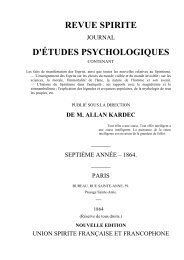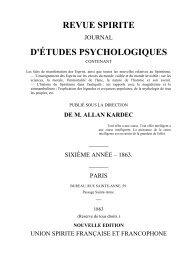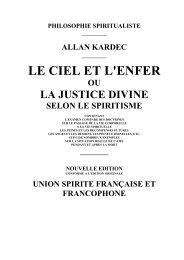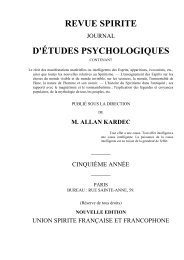PDF version - Geae
PDF version - Geae
PDF version - Geae
You also want an ePaper? Increase the reach of your titles
YUMPU automatically turns print PDFs into web optimized ePapers that Google loves.
CHAPTER XXVII<br />
REVELATION OF SORROW<br />
It is in the face of suffering that we feel the necessity of a robust faith, which at the same time rests on<br />
reason and on facts, and which explains the enigma of life and the problem of sorrow. What consolation can<br />
materialism and atheism offer a man attacked by an incurable malady? What can they say to one about to die?<br />
What language can they use to the father or mother kneeling by the cradle of a dead child? To all those who<br />
see the forms of cherished beings descending into the earth? There and then is shown the poverty and<br />
insufficiency of those doctrines of nothing. Sorrow is not only the criterion of life – the judge which weighs<br />
the character and measures the true grandeur of the man; it is also the infallible process of recognizing the<br />
value of philosophical theories and religious doctrines. The best will evidently be that which comforts us, that<br />
which says: ‘Why, tears are the human lot!’ and at the same time furnishes the means of drying them. By<br />
sorrow we must surely discover the place from whence shines the brightest, purest ray of truth, which does not<br />
become extinguished.<br />
For those whose lives are limited by narrow horizons of materialism, the problem of sorrow is<br />
insoluble. If the universe is but a field open to the capricious, blind forces of nature, then sorrow has no sense<br />
– no utility, and can find no consolations. Is it not really strange, how impotent have been so many of the sages<br />
and philosophers and thinkers, for thousand years, to explain sorrow, or give us consolation, or aid us to accept<br />
it! Sorrow is so inevitable! Yet few have comprehended it – fewer have explained it. About us every day, how<br />
poor, banal, and childish are the words of sympathy and the efforts at consolation offered to those who are<br />
stricken by sorrow. How cold are the words which fall from human lips! What absence of light and warmth in<br />
thoughts and hearts! What weakness – what voids – in the processes employed by those who seek to give<br />
comfort!<br />
All this results mainly from the obscurity which rests upon the problem of sorrow, and the false<br />
doctrines of certain philosophies. They burden and shadow the soul in difficult hours, in place of giving it the<br />
means to face its destiny with a firm resolution.<br />
And the religions? You ask. Yes, certainly, without doubt, the religions have given spiritual<br />
sustenance to souls in distress. Nevertheless, the consolations they offer repose upon a conception too narrow<br />
for the aim of life and the laws of destiny. The Christian religions comprise the grand role of suffering, but<br />
they have exaggerated it, and denatured its sense. Paganism expressed joy, and their gods were crowned with<br />
flowers at their fêtes. The Stoics, however, and certain secret schools considered sorrow as an indispensable<br />
element in the order of the world. Christianity deified it in the person of Jesus. Before the Cross of Calvary<br />
humanity found its own cross less heavy. The memory of the great sacrifice has aided man to suffer and die.<br />
But in pushing things to an extreme, Christianity has given life, death, religion, and God lugubrious and often<br />
terrifying aspects. It is necessary to readjust the religions, or they will lose their empire. Materialism threatens<br />
to take possession of their lost territory, for lack of a doctrine adapted to the necessities of the time and the<br />
needs of evolving humanity.<br />
That is why we say to all the preachers of all religions: ‘Enlarge the compass of your teachings – give<br />
man an idea of a more extended destiny – a clearer view of the life Beyond – a higher ideal of the goal to be<br />
attained. Make him comprehend that his work consists in reconstructing himself with the aid of sorrow to a<br />
higher consciousness for his moral personality through an infinity of time and space.’ If, at the present<br />
moment, your influence as a teacher is weakened, it is not because of a lack of morale in those you teach – it is<br />
because of the insufficiency of your conception of life, which does not show clearly that justice rules: and<br />
consequently does not show God. Your theologies have enclosed thought in a narrow circle which stifles. They<br />
have given it too constrained a foundation, and on this foundation the edifice trembles and threatens to fall.<br />
Stop discussions of texts; come up out of the crypts where you have shut your soul – go forward and act! A<br />
new doctrine is rising – growing – extending – which will aid thought to accomplish its work of<br />
transformation. The new Spiritualism contains all the resources necessary to console the afflicted, enrich<br />
philosophy, regenerate religion, and to attract at one time the affection of the most humble disciple and the<br />
respect of the greatest genius. It satisfies the noblest flights of intellect and the aspirations of the heart. It<br />
122
















